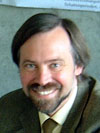Invited Speech
Friday August 22,
Prof. Klaus Schilling (University Wuerzburg)
"Assistance Systems for the Control of Rovers"
 Abstract.
Abstract.
The increased capabilities of robotic vehicles to handle in autonomous or tele-operated way complex tasks have been demonstrated impressively at recent competitions, like the "Grand Challenge" in USA (2004, 2005,2007) or at ELROB in Europe (2006, 2007). The techniques used for these robotic vehicles in the field of sensors, sensor data processing and control offer enormous potential to improve in integrated drive assistance systems the safety aspects of future cars in the streets.
The team of the University Wuerzburg was involved in Mars Rover developments for the European Space Agency ESA and transferred similar navigation and tele-operation techniques also to industrial transport rovers and to remotely controlled rovers for harsh environments (by example to support fire fighters in search and rescue operations during emergencies). Related assistance systems support the tele-operator in situation awareness to more reliably detect obstacles and dangers. The vehicle should be able to handle difficult situations autonomously, like obstacle avoidance and a return to the base, in particular when the radio link is lost. Interesting progress in sensor systems (new principles like PMD-camera, future navigation systems like Galileo,...), in miniaturization, in man-machine interfaces (like augmented reality approaches) and sensor data processing provide here exciting perspectives for innovations. Assistance systems enable a range of scalable reactions, which initiate appropriate actions adapted to the specific situation and to the operator's skills . As specific example the assistance system of University Wuerzburg will be presented, which was the winner of the "urban scenario" competition at ELROB 2007, where in a city environment hidden markers were to be detected and identified.
Biography.
Prof. Dr. Klaus Schilling's activities in space industry addressed the development of interplanetary satellites and vehicles, in particular autonomous control and tele-operation strategies. Today he is chair for Robotics and Telematics at the Julius-Maximilian-University Wu"rzburg and chair of the board of the applied research institute "Center for Telematics". His main research emphasis is on mobile robots, teleoperated and autonomous robot control systems. Related methods have been applied in space exploration, in tele-maintenance of equipment in industrial production, in remote laboratories for tele-education, in search and rescue systems. He is affiliated with IFAC (2002-2005 chair of TC on Aerospace, 2008-2011 chair TC on Computers and Telematics) and was Consulting Professor at Stanford University (2002-2006).
 Abstract.
Abstract.